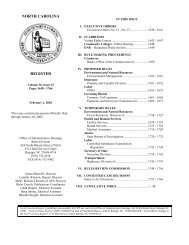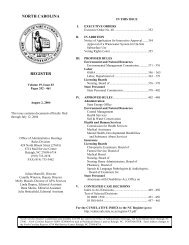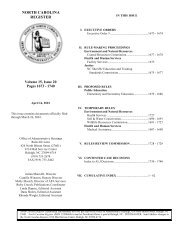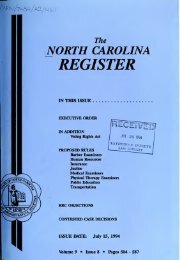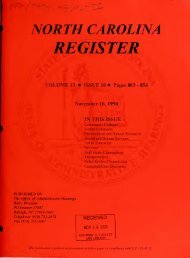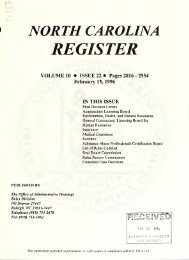NC Register Volume 19 Issue 06 - Office of Administrative Hearings
NC Register Volume 19 Issue 06 - Office of Administrative Hearings
NC Register Volume 19 Issue 06 - Office of Administrative Hearings
You also want an ePaper? Increase the reach of your titles
YUMPU automatically turns print PDFs into web optimized ePapers that Google loves.
PROPOSED RULESAuthority G.S. 126-4.must be geographically separated from othercompany property. The management <strong>of</strong>operations within one or among severalbuildings located on a single or adjoiningtracts <strong>of</strong> company property does not qualifyfor the executive exemption. In the case <strong>of</strong> abranch, there must be a true and completephysical separation from the main <strong>of</strong>fice.25 <strong>NC</strong>AC 01D .<strong>19</strong>43 ADMINISTRATIVEEMPLOYEES(a) An employee is exempt as an administrative employee, if all<strong>of</strong> these conditions are met:(1) primary duty consists <strong>of</strong> performing <strong>of</strong>fice ornon-manual work directly related tomanagement policies or general businessoperations <strong>of</strong> agency, institution, school, orany department or sub-division there<strong>of</strong>;(2) customarily and regularly exercises discretionand independent judgement, as distinguishedfrom using skills or following procedures;(3) regularly and directly assists an agency head,or an executive, administrative, or pr<strong>of</strong>essionalemployee, or performs under only generalsupervision work along specialized andtechnical lines requiring special training,experience or knowledge, or in theperformance <strong>of</strong> functions in administration <strong>of</strong>a school system or educational institution inwork directly related to academic instructionor training;(4) does not devote more than 20 percent <strong>of</strong> thehours worked during a workweek innon-exempt work;(5) is paid on salary or fee basis <strong>of</strong> at least onehundred fifty-five dollars ($155) a week,exclusive <strong>of</strong> board, lodging, or other purposes.Exception: An administrative employee who is paid on salaryor fee basis <strong>of</strong> at least two hundred fifty dollars ($250) a week[thirteen thousand ($13,000) dollars annual rate] and who meetsfirst two conditions above is exempt. The percentage tests fornon-exempt work do not apply.(b) Types <strong>of</strong> <strong>Administrative</strong> Employees - There are three types<strong>of</strong> employees who are exempt as administrative employees ifthey meet all the other conditions. These employees are:(1) Executive and administrative assistants. Thisfirst type is the assistant to a proprietor or to anexecutive or administrative employee. Typical<strong>of</strong> this group are executive assistant to thepresident, confidential assistant, executivesecretary, assistant to the general manager, andadministrative assistant. These assistants areusually found in large establishments wherethe <strong>of</strong>ficial assisted has so many duties thatsome must be delegated.(2) Staff employees. Employees in the secondgroup are staff rather than line employees(functional, rather than departmental heads).They include employees who act as advisoryspecialists to the management. Examples aretax experts, insurance experts, researchexperts, wage rate analysts, investmentconsultants, foreign exchange consultants, andstatisticians. Also included are those in charge<strong>of</strong> a so-called functional department that mayfrequently be a one-person department.Examples are purchasing agents, buyers,safety directors, and personnel directors.(3) Special assignment employees. The thirdgroup consists <strong>of</strong> persons who perform specialassignments. Among them are persons whowork away from their employer's place <strong>of</strong>business. Examples are traveling auditors,buyers, and traveling inventory employees.The group also includes employees whosespecial assignments are performed entirely orpartly inside their employer's place <strong>of</strong>business.(c) Employees possibly qualifying for the administrativeemployee exemption have extremely diverse functions and awide variety <strong>of</strong> titles. A title alone is <strong>of</strong> little or no assistance indetermining an employee's exempt or non-exempt status. Thestatus <strong>of</strong> the employee should be determined on the basis <strong>of</strong>whether duties, responsibilities and salary meet all therequirements <strong>of</strong> the rules.(d) Primary Duty - To qualify for exemption as anadministrative employee, an employee must have as a primaryduty <strong>of</strong>fice or non-manual work directly related to managementpolicies or general business operations <strong>of</strong> the employer or theemployer's programs. This condition is met only by employeeswho participate in the formulation <strong>of</strong> management policies or inthe operation <strong>of</strong> the business as a whole - it is also met byemployees whose work affects policy or who execute policy andby employees whose work affects business operations to asubstantial degree even though their assignments are only for aparticular segment <strong>of</strong> the business.(e) Discretion and Independent Judgement - These terms areinterpreted to mean the authority to make an independent choice,free from immediate supervision, in significant matters. Theyshould not be confused with the use <strong>of</strong> skill in applyingtechniques, procedures, or specific standards.(1) Example 1: Inspectors normally dospecialized work along standardized linesinvolving well established techniques andprocedures that may have been catalogued anddescribed in manuals or other sources. Theseinspectors use skill rather than discretion andjudgement.(2) Example 2: A shipping clerk is normallypermitted to decide the method <strong>of</strong> packing andthe mode <strong>of</strong> shipment <strong>of</strong> small orders, and abookkeeper may usually decide whether theemployee will post first to one ledger ratherthan another. These decisions do not deal withsignificant matters.<strong>19</strong>:<strong>06</strong> NORTH CAROLINA REGISTER September 15, 2004625




